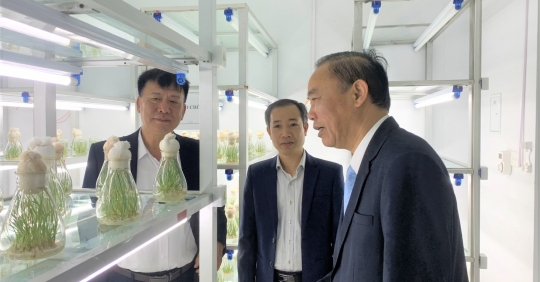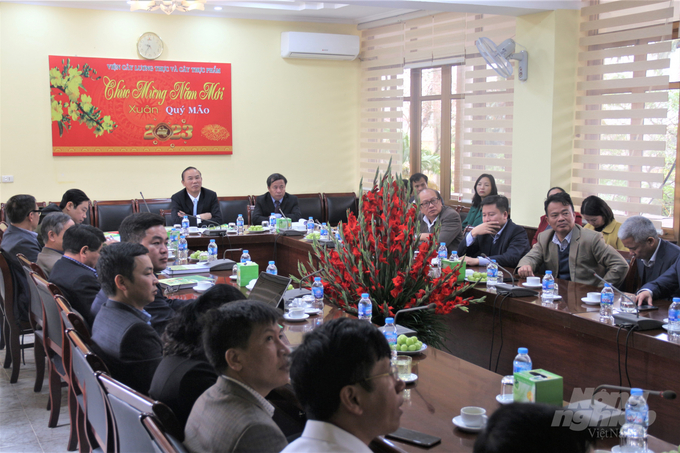
Deputy Minister Phung Duc Tien (center) led a delegation from the Ministry of Agriculture and Rural Development to visit and work at the Institute of Food Crops and Food Crops on Feb. 2. Picture: Pham Hieu.
over a decade successful research 95 new plant varieties
On February 2, Deputy Minister Phung Duc Tien led a delegation from the Ministry of Agriculture and Rural Development to visit and work at the Institute of Food and Food Crops (Vietnam Academy of Agricultural Sciences).
according to dr Nguyen Trong Khanh, director of the Institute for Food Plants and Food Plants, one of the outstanding achievements of the institute in the period 2011 – 2022 is the successful research of 95 new plant varieties of all kinds. Of these, 58 varieties are officially recognized or registered for marketing, 37 varieties are for the experimental production recognized. In addition, the institute has 6 procedures for the recognition of new technical advances.
Regarding the research orientation of the institute in the period 2023 – 2030, Dr. Nguyen Trong Khanh that in the coming period the unit will carry out basic research with special focus on genetics and physiology, biochemistry, biotechnology… for the service of plant breeding and breeding research.
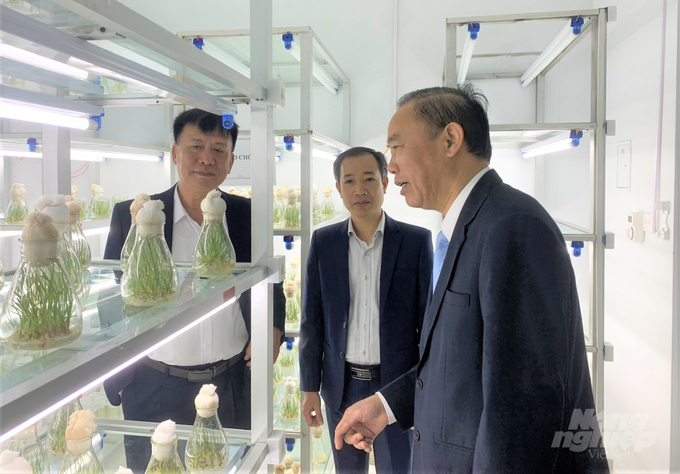
Deputy Minister Phung Duc Tien highly appreciated the achievements of the Institute of Food Crops and Food Crops in the past period. Photo: Pham Hieu.
The institute will also select and develop new varieties of plants with high yield, good quality, resistance to large pests and diseases, and unfavorable conditions, suitable for different ecological regions. Improving the quality of new plant varieties in order to be competitive in terms of regional raw material quality and gain access to international markets.
The institute will focus in particular on the research and transfer of integrated technical measures and high-tech agriculture. Research and development of industries for the commercialization of agricultural products. Promoting production development along the value chain, connecting the consumption of scientific and technological products. Research and propose strategies for agricultural and rural economic development.
“To achieve these goals, the Institute for Food Crops and Food Crops will focus on long-term solutions in the coming period. In particular, the development of scientific and technological potential such as strengthening the training of leading experts in research areas for access to modern research in the world,” emphasized Dr. Nguyen Trong Khanh.
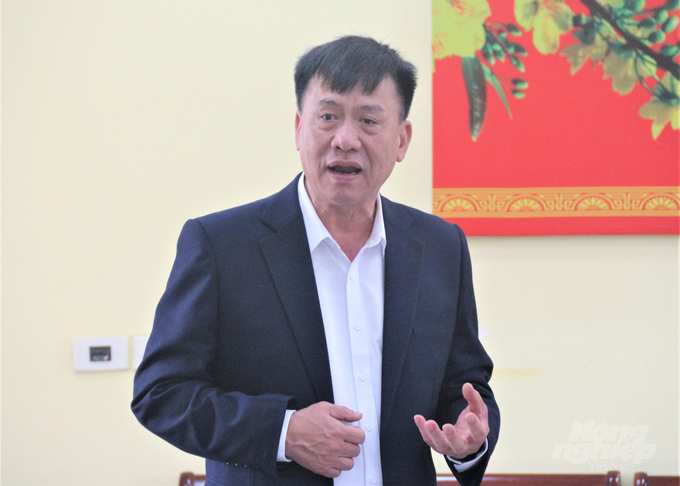
dr Nguyen Trong Khanh said that the institute successfully researched 95 new plant varieties of all kinds in the period 2011-2022. Photo: Pham Hieu.
In addition, the institute also aims to develop a development master plan and continue to invest in strengthening the material and technical base for research and development of science and technology.
In the coming period, the Institute of Food Crops and Food Crops will develop research programs, topics and projects, and transfer integrated technology for each crop. Diversification of sources of funding for scientific and technological research and development through contracts, tenders, government contracts, places and resources from international cooperation.
Strengthen the transfer of technical progress and cooperation with enterprises in research and transfer, to increase the funding of research work, while promoting the rapid development of institute scientific and technological products into production.
In scientific research, don’t let the end of the subject be the end of the production
At the meeting, Mr. Nguyen Quang Tin, deputy director of the Ministry of Science, Technology and Environment, said that the Institute of Food Crops and Food Crops is a large entity, and priority should be given to multi-tree research of scientific research topics. Therefore, in the past period, the institute has made many achievements of scientific and technical progress.
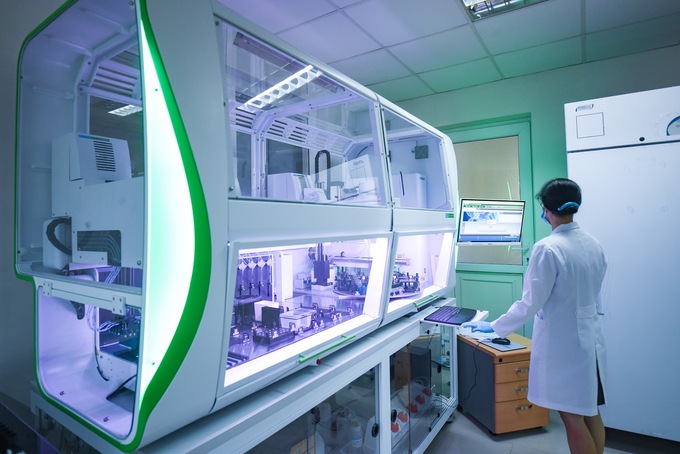
Science and technology play an important role in restructuring the agricultural sector. Picture: tung thing.
Accordingly, Mr. Tin said that in addition to traditional studies, the institute should focus on high-quality research aimed at supporting the livelihoods of people in mountainous, remote and difficult areas.
“In addition, breakthroughs must be achieved in the research content of high and biotechnology. At the same time, the institute must continue to coordinate with domestic enterprises and promote international cooperation to improve scientific research resources,” said a representative of the Ministry of Science, Technology and Environment.
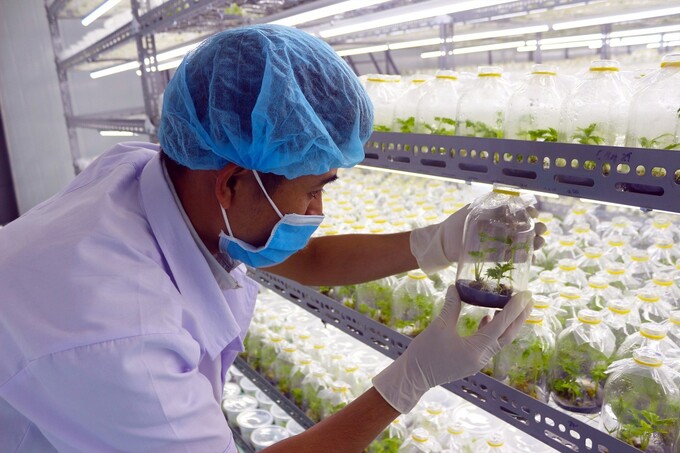
The Institute of Food Plants and Food Crops will develop research programs, topics and projects, and transfer integrated technology for each crop.
According to Mr. Nguyen Nhu Cuong, director of the Department of Crop Production, the institute’s crop studies are currently uncompetitive to companies such as cassava, soybean, peanut, etc., which play an important role in tree restructuring. However, the crops that companies compete with, such as rice, vegetables, etc., are still weak and the products are not capable enough to compete with the companies.
Therefore, Mr. Cuong reiterated that in the coming period, the Ministry of Crop Production will continue to coordinate with the Vietnam Academy of Agricultural Sciences in general and the Institute of Food Crops and Food Crops in particular to establish “orders” of food crops. seed research. However, the Institute for Food Plants and Food Crops must also develop a “long-term” orientation and strategy in terms of personnel and space.
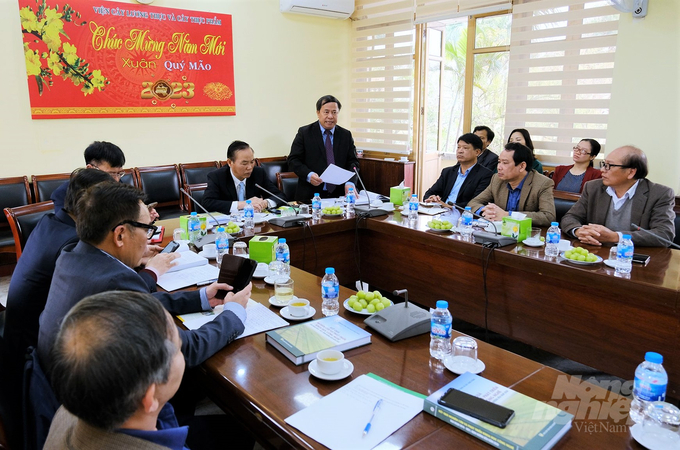
Mr. Nguyen Hong Son (standing) said that the Institute of Food Crops and Food Crops is an important unit in the implementation of scientific and technological research tasks in the unit system of the Vietnam Academy of Agricultural Sciences. Picture: Bao Thang.
According to Mr. Nguyen Hong Son, director of the Vietnam Academy of Agricultural Sciences, the Institute of Food Crops and Food Plants, which has inherited great achievements from agricultural scientists, is a key unit in the implementation of tasks of science and technology research service in the system of units of Vietnam Academy of Agricultural Sciences.
“Although the institute’s rice varieties represent a very small percentage of production, they are the precursors to the rice varieties that companies mass-produce today. In particular, many of the institute’s vegetables have outstanding advantages in terms of properties compared to other units,” emphasizes Mr. Nguyen Hong Son.
Accordingly, the heads of the Vietnam Academy of Agricultural Sciences suggested that the institute should encourage creativity and invest more in basic research in the coming period. On the part of state administrative bodies, commissioned work must also increase the content of scientific and technical tasks.
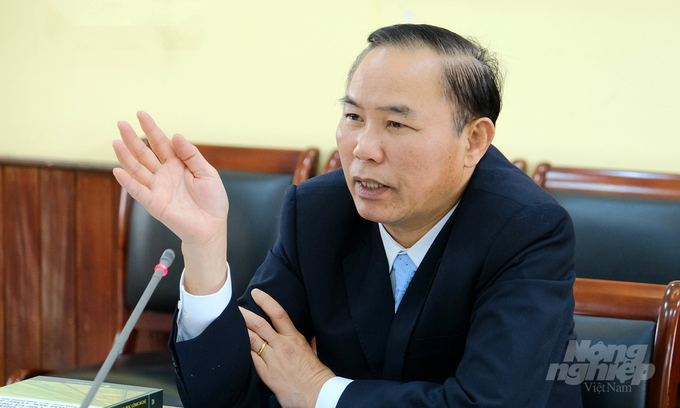
Deputy Minister Phung Duc Tien said the Institute of Food Crops and Food Crops must remain the owner and independent from duties ranging from organization to finance. Picture: Bao Thang.
Closing the meeting, Deputy Minister Phung Duc Tien repeatedly stressed that the role of food security is very important in the current complicated socio-economic context. The great contributions of science and technology to the field of agriculture in general and cultivation in particular should not go unmentioned.
According to the deputy minister, the volatile situation affected by food insecurity or food shortages will lead to instability in society. However, reality also shows that interest and investment in science and technology in agriculture has been limited in recent years.
Therefore, the heads of the Ministry of Agriculture and Rural Development said that the Institute of Food Crops and Food Crops must continue to be the owner and autonomous of tasks, organization and funding.
“In particular, units must put aside the mindset of ‘showing off’ beautiful, formal models and encourage the implementation of actual local production to produce valuable products. . Don’t let the end of the issue be stopping production,” said Deputy Minister Phung Duc Tien.
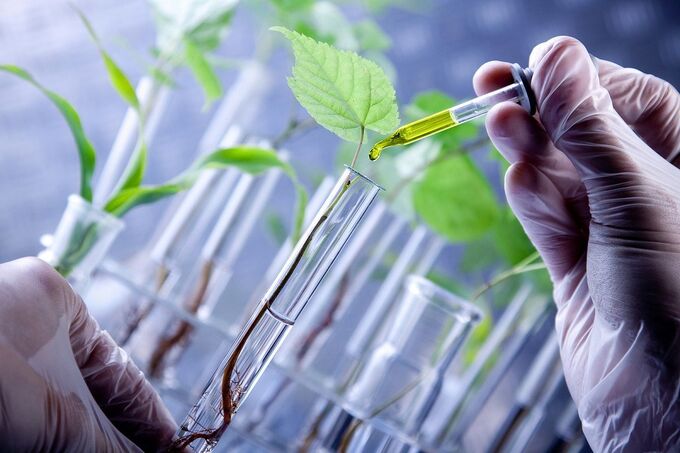
It is necessary to promote and improve the quality of human resources, improve facilities and maintain the agricultural scientific research equipment system. Photo: tsp.
The deputy minister also called on the Institute of Food Plants and Food Crops, the Vietnam Academy of Agricultural Sciences and the Department of Crop Production, Department of Science, Technology and Environment to “fight together”, researchers and market researchers of the school, the implementers in the Practice.
“We already have space, we have a development base. In the coming period, there is a need to promote and improve the quality of human resources, improve facilities, maintain and maintain the scientific research equipment system,” said Deputy Minister Phung Duc Tien.
Currently, according to Mr. Nguyen Hong Son, the yield of rice varieties has reached the “upper limit”, but the quality is only medium and low. Therefore, the Institute of Food Crops and Food Plants needs to improve pest and disease resistance to reduce production costs for rice farmers.
At the same time, the institute needs to conduct research to improve the variety of uses of rice, to conduct in-depth analysis to create rice varieties with functions and nutritional value suitable for the needs of each consumer group.
“For cassava, the institute needs to continue to coordinate with other units to simultaneously improve productivity as well as resistance to pests and diseases, especially cassava leaf mosaic disease,” said a representative of the Vietnam Academy of Agricultural Sciences.

